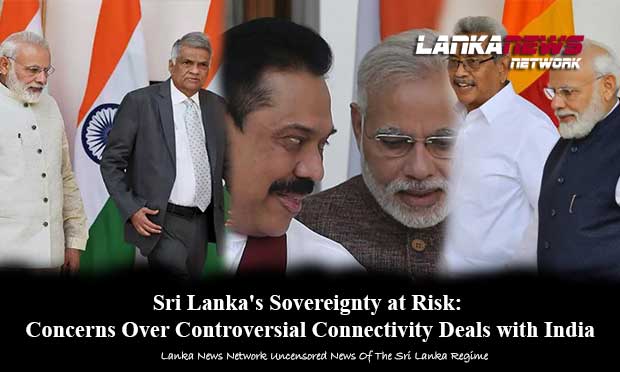In a recent meeting on July 21, 2023, between Indian Prime Minister Narendra Modi and Sri Lanka’s President Ranil Wickremesinghe, discussions centred on enhancing connectivity between the two nations. However, these ambitious connectivity deals have sparked concerns among Sri Lanka’s citizens about potential risks to their country’s sovereignty and the exploitation of its resources. As the agreements progress, questions arise over their impact on Sri Lanka’s weak economy and the influence of India on the island’s governance.
Connectivity Deals and Sovereignty Concerns
While both leaders expressed their commitment to strengthening connectivity between India and Sri Lanka, the lack of transparency surrounding the scope and implications of these agreements has left Sri Lanka’s citizens questioning the potential consequences for their nation’s autonomy and democratic governance.
Maritime Connectivity: Consolidating Control?
Cooperation in developing ports and logistics infrastructure at Colombo, Trincomalee, and Kankesanthurai raises concerns about the consolidation of regional logistics and shipping under India’s influence. Critics worry that Sri Lanka’s strategic assets could become vulnerable to external control, thereby challenging the country’s sovereignty over its maritime affairs.
Air Connectivity: Exploiting Vulnerabilities?
While resuming flights between Jaffna and Chennai fosters people-to-people ties, the proposed expansion of air connectivity to Colombo and other destinations raises concerns about India’s potential influence over Sri Lanka’s air transport and airspace management. Critics fear this may undermine Sri Lanka’s autonomy in critical sectors, leaving it susceptible to losing control of airports and other infrastructure.
Energy and Power Connectivity: Dependency on India?
Agreements on power grid interconnection and laying multipurpose pipelines to supply cooking gas and fuel from Nagapatnam in South India up to Colombo via Trincomalee will enable India to control Sri Lanka’s energy needs. The past example of a landlocked country, Nepal, facing dependency issues with India as the sole supplier for LP gas, fuel, food, and medicine, serves as a warning. Sri Lanka must carefully consider the long-term concerns about potential dependency on India for essential resources, leaving it vulnerable to the exploitation of its energy sector and resources at the expense of its own weak economy.
Trade, Economic, and Financial Connectivity: Economic Puppetry?
While promoting bilateral trade and investments is vital for economic growth, there is a concern that Sri Lanka’s weak economy and governance may lead to India’s undue influence over key sectors, potentially turning the country into a state where decisions are dictated by external interests.
Conclusion
Proposed connectivity deals between India with a population of 1.2 billion people and Sri Lanka, which has 22 million people, must be carefully evaluated to ensure that they offer more opportunities than disadvantages for Sri Lankans. The agreements should not compromise the sovereignty of the country or lead to the selling off of strategic places in the Eastern and Northern provinces. The cabinet and parliament that sanction these agreements should be held accountable by future governments. Elected officials who approve of these agreements should be mindful that betraying the sovereignty of the country’s people could have repercussions at the forthcoming elections.
Shantha Jayarathne
Former Senior Consultant
Sri Lanka Institute of Development Administration (SLIDA)
04.08.2023

